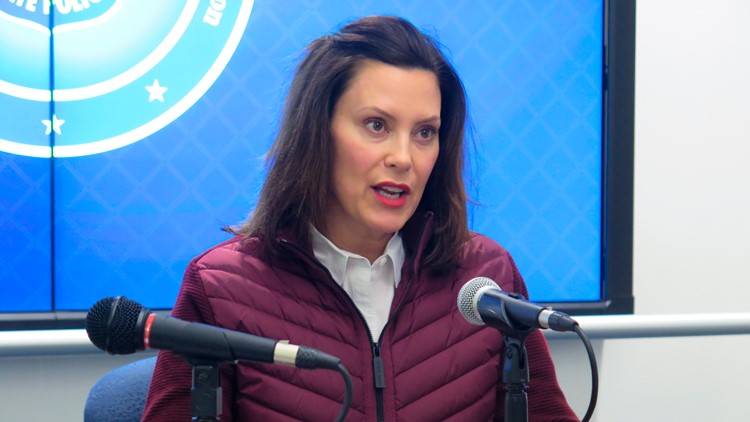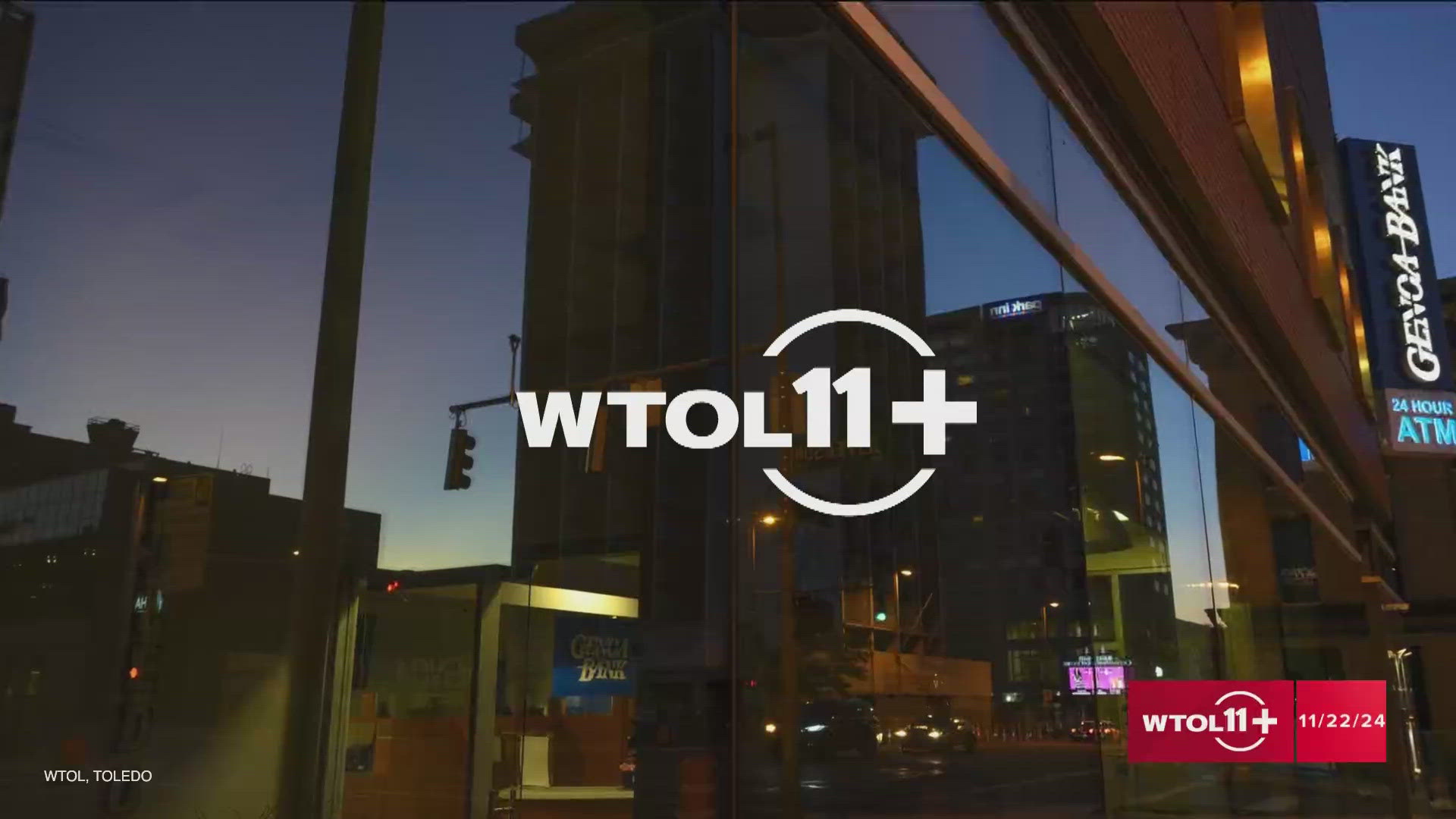MICHIGAN, USA — Every state in the U.S. and countries worldwide are taking precautionary steps to combat the spread of the coronavirus. Michigan is no exception. Within a week, Michigan went from reporting its first cases to having 65 in the state.
Before and during the outbreak of the virus in Michigan, Gov. Gretchen Whitmer has taken steps to mitigate the spread of the virus.
Since the first two confirmed cases in the state were reported on March 10, Whitmer has ordered drastic changes in Michiganders' lives including closing schools and prohibiting bars and restaurants from providing dine-in services. Here is a timeline of how Whitmer has responded to the coronavirus.
MARCH 3
Created COVID-19 task forces.
- The COVID-19 Task Force on State Operations, which will oversee all aspects of state operations, including employment and facilities.
- The COVID-19 Task Force on Health and Human Services, which will cover the provision of medical and human services.
- The COVID-19 Task Force on Education, which will cover all K-12 public schools, universities and colleges
- The COVID-19 Task Force on Economy/Workforce, which will cover the general economic impact, workforce, supply chain and business continuity.
MARCH 6
Ensured Medicaid waiver for copays & cost sharing for testing. The free testing is related to health care treatment related to the coronavirus.
MARCH 10
Declared a State of Emergency after the first two cases were confirmed in the state. Whitmer said the state of emergency will maximize efforts and assist local governments and officials to slow the spread of the virus.
MARCH 11
Recommended mitigation strategies after the state's first two confirmed cases. Whitmer recommended that Michiganders take the state's advice to help stop the spread of the new virus such as to educate themselves about what COVID-19 is, to stay home when you are sick and to disinfect household items.
“It’s on all of us to be safe and be smart for ourselves, our loved ones, our coworkers, and the public at large," Whitmer said in a press conference.
MARCH 12
Expanded access to telemedicine, which allows patients to virtually connect with their doctors and be diagnosed by communicating through smartphones and computers.
Closed all K-12 schools. Schools are scheduled to reopen on Monday, April 6. During the closure, teachers will educate their students through online learning. This is the first major order she issued that affected day-to-day life in Michigan.
MARCH 13
Prohibited large gatherings 250+. Since then, she lowered that number to groups of more than 50.
Restricted entry into care facilities & juvenile justice facilities.
MARCH 14
Enhanced restrictions on price gouging on items including goods, materials, emergency supplies and food. The order took effect March 16 and will remain in effect until April 13.
"Since the onset of this emergency, it has become apparent that some businesses and individuals are selling face masks, hand sanitizers, cleaning supplies, paper products, and other products that people might seek to purchase due to the threat of COVID-19 at unjustified, exceptionally high prices," the executive order said.
MARCH 16
Closed places of public accommodation including bars and restaurants. Under the closure, the food service industry can still provide food and drinks to customers through pick-up and delivery services. The restrictions are expected to remain in place until March 30 at 11:59 p.m.
Prohibited large gatherings of 50 or more people. This restriction is expected to last until April 5 at 5 p.m.
Expanded unemployment benefits. Under the governor’s order, unemployment benefits would be extended to:
- Workers who have an unanticipated family care responsibility, including those who have childcare responsibilities due to school closures, or those who are forced to care for loved ones who become ill.
- Workers who are sick, quarantined, or immunocompromised and who do not have access to paid family and medical leave or are laid off.
- First responders in the public health community who become ill or are quarantined due to exposure to COVID-19.
Lifted road weight restrictions for truck drivers delivering medical supplies and equipment related to diagnosing and treating COVID-19, and community disinfectant supplies such as soap, hand sanitizer and gloves.
MARCH 17
Expanded hospital and healthcare facility capacity in Michigan to ensure that enough healthcare providers are available to treat patients amid the coronavirus pandemic.
Read more: Whitmer signs executive order to help ensure more healthcare workers are available to patients
MARCH 18
Extended tax foreclosure deadline for Michigan residents to pay back their taxes and avoid foreclosure on their property throughout the coronavirus pandemic.
Allowed public bodies to meet electronically amid coronavirus concerns. Public bodies can utilize telephone or video-conferencing methods to meet as long as the general public is provided access.
Expanded capacity for disaster relief child care services for essential workforce such as health care workers, first responders, and other members of the essential workforce providing critical infrastructure to Michiganders during the coronavirus (COVID-19) crisis.
MARCH 20
Suspends evictions during the COVID-19 pandemic. Renters and mobile homeowners will be protected from eviction. It takes effect immediately and lasts until April 17 at 11:59 p.m.
Whitmer outlined some of these actions Tuesday in a tweet as a response to President Trump after he said, "Failing Michigan Governor must work harder and be much more proactive. We are pushing her to get the job done. I stand with Michigan!"
In the tweet, she said, "for those who have questions about the state’s actions to mitigate the spread of coronavirus, please call our COVID-19 Hotline at 1-888-535-6136 between 8 a.m - 5 p.m. daily."
MARCH 21
Orders salons, spas, other personal care services to close. Whitmer signed an executive order than says all non-essential personal care facilities must close through April 13.
Read more: Whitmer order temporarily closes salons, tattoo parlors, spas and other personal care services
Extends closure of bars, restaurants, more. Whitmer extended the closure of places of public accommodation until April 13 at 11:59 p.m. This includes bars, restaurants, gyms, theaters, libraries, museums and more.
MARCH 23
Signs 'stay home, stay safe' executive order to curb the spread of the coronavirus. The order allows for an exemption for certain workers, outdoor exercise and trips to the grocery store or hospital.
The order, which will take effect at 12:01 a.m. Tuesday, will allow essential employees necessary to sustain and protect life to continue going to work. It also will bar all public and private gatherings of any number of people occurring outside a single household,
MARCH 25
Extends deadline to complete canvass of state's primary election, so state resources can remain focused on addressing the coronavirus.
Temporarily allows other administrative hearings by video conference call to allow for social distancing. Read the order here.
Expands unemployment eligibility and cost-sharing to clarify how benefits will working during COVID-19. Read the order here.
Eases restrictions on pharmacists to allow patients to receive emergency refills for up to 60 days worth supply. Read the order here.
MARCH 27
Extends tax filing deadline to July 2020 to give residents more time amid pandemic.
Expands absentee voting in the May 5 election. The order encourages Michiganders to vote absentee by allowing the Department of State to assist local jurisdictions in mailing absentee ballot applications to every registered voter, and to provide absentee ballots directly to new registrants.
MARCH 28
Requires water services to be reconnected for residents that had it shut off. The order will last the duration of the COVID-19 emergency.
MARCH 29
Signed an executive order that provides protections to "vulnerable populations" within Michigan county jails, local lockups and juvenile detention, including more screenings, visitation restrictions, providing PPE equipment for staff and minimizing crowding.
Whitmer also relaxed Michigan's medical practice laws to allow certain qualified healthcare workers more flexibility in treating COVID-19 patients. Healthcare workers are still asked to provide medical care that is within their scope of education, training and experience, but physician assistants and advanced practice registered nurses are now allowed to treat patients without the supervision of a licensed physician.
STATE RECOMMENDATIONS FOR COVID-19
Patients with confirmed infection have reportedly had mild to severe respiratory illness with symptoms of:
- Fever
- Cough
- Shortness of breath
The best prevention for viruses, such as influenza, the common cold or COVID-19 is to:
- If you think you have been exposed to COVID-19, call your health care provider. If you do not have a health care provider, call the nearest hospital.
- Wash your hands often with soap and warm water for 20 seconds. If not available, use hand sanitizer.
- Avoid touching your eyes, nose, or mouth with unwashed hands.
- Cover your mouth and nose with a tissue or upper sleeve when coughing or sneezing.
- Avoid contact with people who are sick.
- If you are sick, stay home, and avoid contact with others.
- Stay at least 6 feet away from others when in a public setting.
►Make it easy to keep up to date with more stories like this. Download the 13 ON YOUR SIDE app now.
Have a news tip? Email news@13onyourside.com, visit our Facebook page or Twitter. Subscribe to our YouTube channel.



